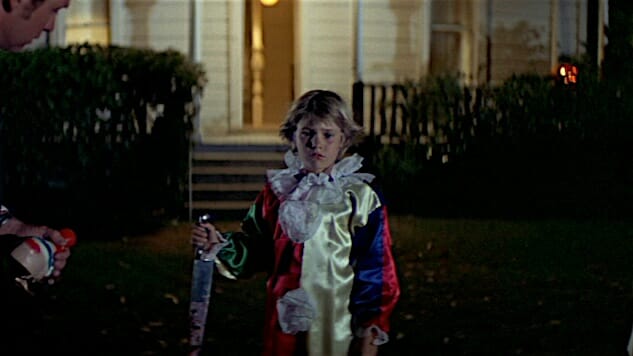Autumn Classics: Halloween
The mother of all slashers turns 40.

Everybody knows fall is the time to turn the lights down and watch macabre movies. This October, we take a look back at four autumnal classics that are celebrating major anniversaries this year, starting with the progenitor of the teen slasher flick, John Carpenter’s Halloween.
The particulars of the slasher genre are so well-known now that an entire subgenre has sprung up to lampoon or deconstruct them: Cabin in the Woods, Final Girl, Behind the Mask: The Rise of Leslie Vernon, to say nothing of the wink-and-nudge fest that was Scream. You know the tropes: Horny kids, negligent parents, an implacable psychotic brick sh*thouse of a murderer with specious or zero motivations, and plenty of ironic, gory deaths for anybody who dares to have a little bit of fun.
So many of the imitators and descendants of the ’70s and ’80s era of slasher films approach their stories with tongue planted firmly in cheek, and it’s easy to forget that in 1978, before the whole craze had really properly taken off, Halloween did not come to play.

Scream is not scary, not really. It might be surprising in parts, but you’d need to ask somebody else, because I honestly couldn’t tell you. Halloween is frightening—starting with the minimalist piano score composed by the director himself, John Carpenter, you can tell this is a movie where the sighing wind and inky shadows are going to be constant threats. More than that, it is dreadful. It is a movie that lurks in plain view and stalks the people who should know better. It puts you behind the eyes of the killer and dares you not to look away. My girlfriend spent almost as much time covering her eyes during it as she did during It.
Halloween wastes no time getting started, and spares nothing in telling us precisely what kind of movie this will be in its opening minutes. The camera adopts the perspective of a voyeur watching a couple of teens getting up to some fun, and then stays with him as he invades the house, waits for the boyfriend to leave, and kills the girl with a knife. It’s only when he’s unmasked that the camera finally exits the killer’s perspective and we see it was a little boy, Michael Myers, in a little clown costume.
This is what your teens are doing, Halloween is saying. This is what your children are doing.
That’s ridiculous and regressive, like a lot of Halloween and like every slasher before the genre started to become a parody of itself. You’d better behave, slasher films of the ’70s and ’80s say, wagging their fingers darkly at us like old maids. You’d better listen to authority figures and not stay out late, and you’d better be a perfect little angel like Laurie Strode, not really the very first final girl, but the one who taught all the others after her their dance steps.
Jamie Lee Curtis’ 40-year career has had ups and downs, but I struggle to think of any misstep that’s ever tarnished the general public’s admiration for her. (Consider that the trailer for the new sequel to Halloween, confusingly just titled Halloween again, put her gray-haired Laurie Strode front and center with a shotgun, to breathless reception.) I really wonder how much of that comes from this very movie, where her naturalistic acting conveys Laurie Strode’s vulnerability and resolve. Feeling fear in our own homes is something so visceral in America that it apparently justifies any level of violence in response, and Curtis’ wide-eyed Final Girl shoulders the gravity of that weighty subtext with as much aplomb as you can ask of someone being stalked by a hulking murderer.

Equally iconic is Donald Pleasence’s turn as Dr. Loomis. Perhaps best known prior to this for portraying perennial Bond baddie Ernst Stavro Blofeld (itself a role so iconic it essentially created a whole parody franchise), the veteran actor invests his every doom-saying line with deep portent and zealous conviction. Behind the Mask: The Rise of Leslie Vernon memorably featured an “Ahab” for the eponymous killer-in-training, and is worth watching just for Robert Englund’s turn as a dedicated hunter in clear homage of Pleasence’s Loomis.
-

-

-

-

-

-

-

-

-

-

-

-

-

-

-

-

-

-

-

-

-

-

-

-

-

-

-

-

-

-

-

-

-

-

-

-

-

-

-

-










































